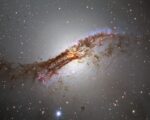A recent study from the Dark Energy Spectroscopic Instrument (DESI) project suggests that dark energy—the enigmatic force driving the accelerated expansion of the universe—may not be constant over time. This finding challenges a key assumption in cosmology but simultaneously reaffirms the accuracy of Albert Einstein’s theory of general relativity. The study, published on the DESI project’s website and arXiv, expands on earlier findings from April that pointed toward a similar conclusion. If confirmed, the results could have profound implications for our understanding of the universe’s long-term evolution.
DESI’s Revolutionary 3D Galaxy Mapping
The DESI project, based at the Kitt Peak National Observatory in Arizona, has constructed the most comprehensive 3D map of galaxies to date. By analyzing this detailed map, researchers can study the large-scale structure of the universe and how it changes over time. Unlike earlier studies that focused on baryon acoustic oscillations—echoes of sound waves from the universe’s infancy—DESI’s latest work delves into the evolution of galaxy clusters. These shifts are particularly sensitive to dark energy’s influence and could reveal changes in its behavior. Dr. Dragan Huterer, a cosmologist from the University of Michigan, noted that this approach provides critical insights into how gravitational forces and dark energy interact over cosmic timescales.
Variable Dark Energy: A Possible Shift in Paradigm
The study’s findings align with earlier DESI analyses, as well as data from other astronomical observations like the cosmic microwave background (CMB), the universe’s oldest light. Together, these data sets suggest that dark energy’s density may have fluctuated over time, rather than remaining static as traditionally assumed. Cosmologist Dr. Pauline Zarrouk of the National Centre for Scientific Research (CNRS) emphasized the importance of these results matching prior analyses, as consistency strengthens the case for a revision of existing cosmological models. If dark energy is indeed variable, it could lead scientists to reimagine the fate of the universe and refine theories about its fundamental composition.
Implications for General Relativity and Cosmology
Despite the intriguing possibility of changing dark energy, the DESI study reinforces the validity of Einstein’s theory of general relativity. The theory continues to accurately describe how gravity operates on both local and cosmic scales, even under the complex conditions observed in the universe’s evolution. However, these findings highlight the need for a deeper understanding of dark energy’s nature and role in shaping the cosmos. As DESI continues its galaxy-mapping mission, future discoveries may provide clearer answers to whether dark energy evolves over time or if alternative explanations better fit the data, potentially redefining our understanding of the universe’s structure and fate.


















